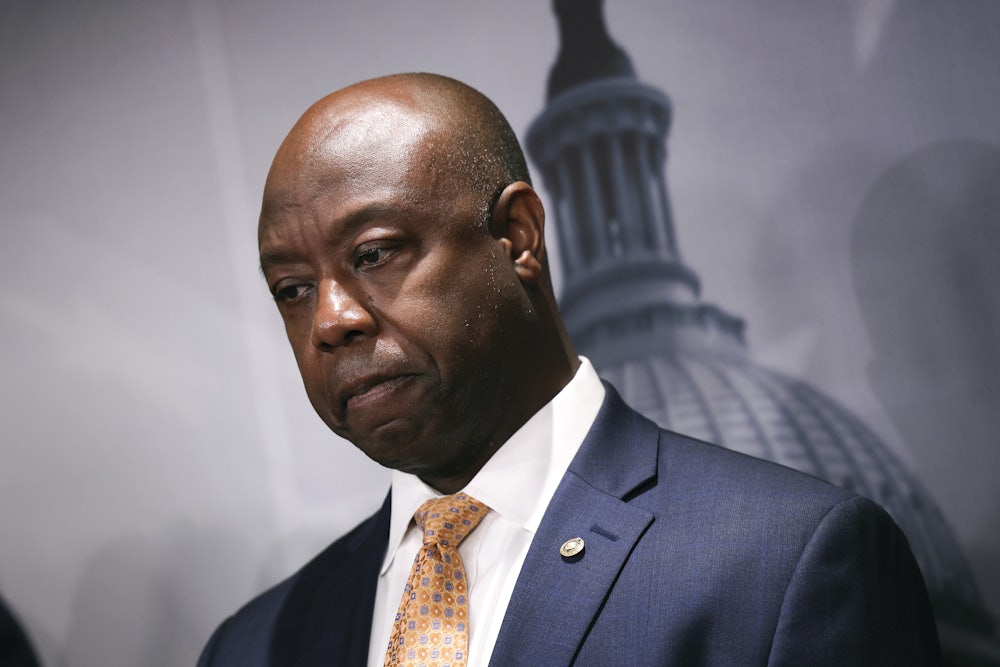Tim Scott thinks he knows how to win the 2024 Republican presidential nomination. While not yet an official candidate—he launched an exploratory committee on Wednesday—the South Carolina senator already has a road map in mind. “A foregone conclusion,” wrote Politico’s Natalie Allison on Thursday, “is that evangelicals—with all their subsets and denominations—will be his top constituency.” But it’s not just evangelicals: Scott also sees a window to appeal to independents and swing voters thanks to his cheerful affect and what Allison describes as the “healthy distance” he kept from Donald Trump during his presidency.
It’s a mostly sensible strategy. Evangelicals make up a sizable portion of both the Republican base and the American electorate in general: A Pew Study found that one in four Americans belonged to an evangelical denomination in 2014. These voters were a crucial part of Trump’s coalition, but his grip on this cohort was always a little loose—and there are signs many are ready to desert him for the right candidate. Bob Vander Plaats, the evangelical political kingmaker, told Vanity Fair that a “silent majority” had already turned against Trump last year. The other candidate who might strongly appeal to evangelicals is Mike Pence, who is largely considered a dud and who didn’t exactly keep Trump at arm’s length; Ron DeSantis, Trump’s main rival for the nomination, is Catholic. So Tim Scott and his advisers aren’t wrong to see a lane emerging in which to run. Pick up evangelicals, roll in independents and swing voters, and voilà: President Tim Scott.
There’s just one problem: abortion. In the wake of the repeal of Roe v. Wade, Republicans are getting hammered across the country. Because their ultimate goal—a total ban—is wildly unpopular, Republican politicians have reverted to the classic political strategy of saying as little as possible about the issue. Evangelicals, of course, consistently rate abortion as one of their most important political issues. The repeal of Roe was a generational victory, and many are unwilling to stop there: Only a nationwide ban will do. And so Tim Scott has a challenge: How do you pick up evangelicals and independents in a post-Roe election?
On Wednesday, he gave it his best shot. It did not go well. Asked by CBS News’s Caitlin Huey-Burns if the federal government should be “involved with something like” Lindsey Graham’s 15-week nationwide ban—not far off from Graham’s pre-Roe bill floating a 20-week ban that Scott co-sponsored—he hemmed and hawed.
GOP Sen. Tim Scott declines to say whether he supports Sen. Lindsey Graham's proposed 15-week federal abortion ban.@CHueyBurns: "If you were president, would you advocate for federal limits?"
— CBS News (@CBSNews) April 12, 2023
Scott: "I'm 100% pro-life."
Huey-Burns: "So, yes?"
Scott: "That's not what I said." pic.twitter.com/SjXUP0gqIh
There’s no question that we’re gonna have a lot of folks talk about legislation from a federal perspective, but what I’ve heard so far, and what I’ve seen in the Senate, aren’t proposals, but those from the left trying to figure out how to continue their campaign towards late-term abortions, even allowing abortions based on the gender of the child or the race of the child or the disabilities of the child.
When CBS followed up by asking a simple question—“If you were president, would you advocate for federal limits?”—Scott’s flop sweat got worse. “So once again, 100 percent pro-life, and I do believe—,” he started before Huey-Burns jumped in with the obvious follow-up: “So yes.” Scott deflected unconvincingly, insisting, “That’s not what I said.”
In a way, he’s correct: He didn’t say that because he never actually answered the question. But he didn’t answer the question because he can’t—he is simply not allowed. Advocating for bans, as Republicans well know at this point, is not a winning political strategy. But anything less than that won’t cut it with evangelicals. And so he served up a heaping plate of word salad.
To his credit, Scott realized his performance on CBS wouldn’t cut it. To his discredit, when he tried to clean up the mess he made on Thursday, he somehow managed to cock it up worse than his previous attempt. Asked at a press conference if he supported a national ban, Scott went full Finnegans Wake:
this is quite the word salad from Tim Scott on a national abortion ban pic.twitter.com/Yk9yFXmPQh
— Aaron Rupar (@atrupar) April 13, 2023
I would simply say that, um, the fact of the matter is that when you look at the issue of abortion, one of the challenges we have; we continue to go to the most restrictive conversations without broadening the scope and taking the look at the fact that I’m 100 percent pro-life, I never walk away from that, but the truth of the matter is that when you look at the issues on abortion, I start with the various important conversations I had at a banking hearing when I was sitting in my office listening to Janet Yellen, the secretary of the treasury, talk about increasing the labor participation rate for African-American women, who are in poverty, by having abortions. I think we’re just having the wrong conversations.
In the same conversation, Scott finally came around to admitting that he would support a 20-week ban, so that is at least a specific policy. But these are the actions of a politician who doesn’t really have a strong answer about what the post-Roe landscape should look like and who’d rather not have to face the question—all the talk about “conversations” and “challenges” is just the stress of his inner monologue leaking into public view. This is how it’s going to be: Republicans are not going to talk about abortion unless they’re forced to, because it’s not a conversation they’re actually prepared to have.
This will be a challenge for the press as GOP politicians will lace the conversations with so much rococo rhetoric and plausible deniability that they may sound like they’ve somehow moderated their past positions. Nevertheless, it’s also an opportunity. Republicans are being evasive about abortion; they’re also lying constantly about their actual positions. The challenge to keep them honest—and to pin them down—is to not move on after their first well-rehearsed barrage of weasel words, but to press and press, as reporters did to Scott. If you support a 20-week ban, why not a 15-week one, a six-week one, or a total ban? Why did you remove your abortion section from your website? How do you reconcile your clear and unrelenting support for a nationwide abortion ban with the rhetorical goulash you’re serving up now? Republicans are being squirrely on the issue. They’re being squirrely because their positions are wildly unpopular. This is all a golden invitation for further scrutiny, and it would be journalistic malpractice to not accept it.










